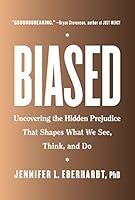# Biased

## Metadata
- Author: [[Jennifer L. Eberhardt]]
- Full Title: Biased
- Category: #books
## Highlights
- A journey is called that because you cannot know what you will . . . do with what you find, or what you find will do to you. —James Baldwin ([Location 123](https://readwise.io/to_kindle?action=open&asin=B07DH89ZDY&location=123))
- Implicit bias is a kind of distorting lens that’s a product of both the architecture of our brain and the disparities in our society. ([Location 192](https://readwise.io/to_kindle?action=open&asin=B07DH89ZDY&location=192))
- Our ideas about race are shaped by the stereotypes to which we are exposed on a daily basis. And one of the strongest stereotypes in American society associates blacks with criminality. ([Location 194](https://readwise.io/to_kindle?action=open&asin=B07DH89ZDY&location=194))
- For nearly fifty years, scientists have been documenting the fact that people are much better at recognizing faces of their own race than faces of other races—a finding dubbed the “other-race effect.” ([Location 259](https://readwise.io/to_kindle?action=open&asin=B07DH89ZDY&location=259))
- That cringe-worthy expression “They all look alike” has long been considered the province of the bigot. But it is actually a function of biology and exposure. Our brains are better at processing faces that evoke a sense of familiarity. ([Location 267](https://readwise.io/to_kindle?action=open&asin=B07DH89ZDY&location=267))
- Our experiences in the world seep into our brain over time, and without our awareness they conspire to reshape the workings of our mind. ([Location 278](https://readwise.io/to_kindle?action=open&asin=B07DH89ZDY&location=278))
- The brain is not a hardwired machine. It’s a malleable organ that responds to the environments we are placed in and the challenges we face. ([Location 287](https://readwise.io/to_kindle?action=open&asin=B07DH89ZDY&location=287))
- Individual expertise, as it turns out, has its own neurobiological signature. ([Location 307](https://readwise.io/to_kindle?action=open&asin=B07DH89ZDY&location=307))
- Categorization—grouping like things together—is not some abhorrent feature of the human brain, a process that some people engage in and others do not. Rather, it is a universal function of the brain that allows us to organize and manage the overload of stimuli that constantly bombard us. It’s a system that brings coherence to a chaotic world; ([Location 376](https://readwise.io/to_kindle?action=open&asin=B07DH89ZDY&location=376))
- Once we’ve decided on the category, our perceptual reality adjusts to suit the label we’ve settled on. ([Location 389](https://readwise.io/to_kindle?action=open&asin=B07DH89ZDY&location=389))
- To form categories is to be human, yet our unique cultures play a role in determining what categories we create in our minds, what we place in them, and how we label them. ([Location 410](https://readwise.io/to_kindle?action=open&asin=B07DH89ZDY&location=410))
- Lippmann understood the role and influence of stereotypes. “For the most part we do not first see, and then define, we define first and then see,” he wrote in his 1922 book, Public Opinion. ([Location 491](https://readwise.io/to_kindle?action=open&asin=B07DH89ZDY&location=491))
- “confirmation bias.” People tend to seek out and attend to information that already confirms their beliefs. We find such information more trustworthy and are less critical of it, even when we are presented with credible, seemingly unassailable facts that suggest otherwise. Once we develop theories about how things operate, that framework is hard to dislodge. ([Location 496](https://readwise.io/to_kindle?action=open&asin=B07DH89ZDY&location=496))
- Just like categorization, the process of stereotyping is universal. We all tend to access and apply stereotypes to help us make sense of other people. ([Location 526](https://readwise.io/to_kindle?action=open&asin=B07DH89ZDY&location=526))
- Bias, even when we are not conscious of it, has consequences that we need to understand and mitigate. The stereotypic associations we carry in our heads can affect what we perceive, how we think, and the actions we take. ([Location 640](https://readwise.io/to_kindle?action=open&asin=B07DH89ZDY&location=640))
- “master status”: the primary way in which one is seen. It elevates that aspect of the self above all others. ([Location 1060](https://readwise.io/to_kindle?action=open&asin=B07DH89ZDY&location=1060))
- “punishment should be pronounced over all criminals proportionate to their internal wickedness.” What becomes the external proxy for internal wickedness? My research has shown that the mere physical features of black defendants can tip the scale toward execution. ([Location 1686](https://readwise.io/to_kindle?action=open&asin=B07DH89ZDY&location=1686))
- The intimacy built into that basic exercise unleashed students’ potential in three ways: It affirmed their own self-image by reminding them of their identity outside the classroom. It allowed them to see school as a supportive place that cared about their beliefs and feelings. It helped teachers to look past stereotypes and understand these students better as individuals. ([Location 2735](https://readwise.io/to_kindle?action=open&asin=B07DH89ZDY&location=2735))
- because the scientific enterprise is iterative, we never seem to get to the point where we think we know enough. ([Location 3628](https://readwise.io/to_kindle?action=open&asin=B07DH89ZDY&location=3628))
- Social scientists fret so much about the purity and precision of science that we rarely throw ourselves into the messy problems of the world. ([Location 3629](https://readwise.io/to_kindle?action=open&asin=B07DH89ZDY&location=3629))
- If we don’t know enough as scientists to shed light on a problem, sometimes it is because we simply aren’t close enough to it. ([Location 3630](https://readwise.io/to_kindle?action=open&asin=B07DH89ZDY&location=3630))
- As a scientist, I don’t arrive on the scene with the answers. I arrive with questions. And my goal is to engage practitioners and encourage them to get involved in the business of putting the puzzle pieces together. ([Location 3631](https://readwise.io/to_kindle?action=open&asin=B07DH89ZDY&location=3631))
- When something is regarded as a norm, people cease to judge it harshly. They are not only inclined to believe that the norm is just “the way things are”; they are inclined to believe that something normative is “the way things should be.” They feel less agency and less motivation to change. ([Location 3645](https://readwise.io/to_kindle?action=open&asin=B07DH89ZDY&location=3645))